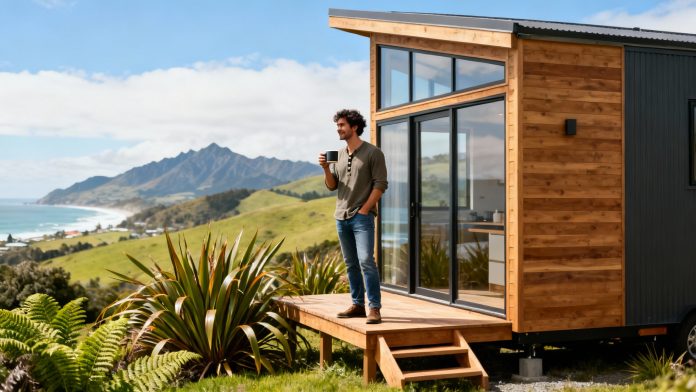Introduction: Freedom, Without the Baggage
Bachelor life is about choices-where to live, how to spend, what to prioritise. In New Zealand’s tight housing market, tiny homes NZ offer an appealing middle path between expensive ownership and impersonal rentals. You get practical space, manageable costs, and the independence of owning something that reflects your style.
This guide expands on why tiny house NZ living is gaining traction with single men across Auckland, Wellington, Christchurch, Tauranga, and regional centres. We will cover affordability, maintenance, space planning, mobility, custom features, sustainability, and the legal and finance essentials-all in clear, no-fuss language.
Affordable on a Single Income
Lower Barriers to Entry
Traditional homes can feel out of reach on one salary. A transportable tiny home or a relocatable home dramatically reduces the upfront cost of getting your own place. Many bachelors pair a small house with KiwiSaver savings, a modest personal loan, or staged upgrades over time, avoiding the multi-decade mortgage drag.
Ongoing Costs That Stay Sensible
-
Utilities: A smaller footprint means less power and water, while efficient heat pumps and LED lighting stretch your dollars.
-
Insurance & rates: If your tiny home sits on leased land or a host property, you may avoid full council rates (the landowner pays those), while you carry contents/structure cover—always check policy specifics.
-
Maintenance: Fewer surfaces, shorter pipe runs, simpler systems.
Bottom line: Tiny homes can convert rent into equity sooner, freeing cash for travel, study, a new ute, or investing.
Low Maintenance and Simple Care
Chores You Can Clear in Minutes
A compact interior means weekly resets are quick: one multipurpose cleaner, a small vacuum, and you are done. Exterior care is streamlined too—Colorsteel or weatherboard cladding plus good gutters, and you are sorted with a basic seasonal checklist.
Innovative Materials for Easy Living
-
Luxury vinyl plank or engineered timber for durable floors
-
Acrylic shower liners that wipe clean
-
Quartz or compact laminate benchtops that shrug off spills

Innovative Use of Limited Space
Every Centimetre Working Hard
Tiny homes avoid dead corners and long hallways. Bachelors appreciate multi-use zones: a breakfast bar that doubles as a desk, a sofa platform with drawers, or a Murphy bed that transforms the room from a gym to a lounge in seconds.
Layout Wins for Single Living
-
Galley kitchen + fold-down table: Cook, work, host.
-
Loft sleeping: Keeps the main level open for training gear, gaming, or instruments.
-
Built-in storage: Under-stair drawers, toe-kick cupboards, ceiling-height cabinets.
Flexibility That Matches Bachelor Life
Move With Your Career-or the Coast
Many tiny homes on wheels (THOWs) can relocate when a job changes or when you want to try a coastal camp-style setup for a season. That mobility suits contract work, apprenticeships, or creatives who bounce between projects.
Ways Flexibility Pays Off
-
Choose urban, rural, or lifestyle block locations without long commitments
-
Trial areas for six months before you settle
-
Add a second module later (studio, gym, workshop)
A quick note: Mobility does not erase the rules—see the Legal & Consent section below.
Custom Features That Add Personality
Tailored to Your Routine
No two bachelors live the same day. Tiny homes make it easy to personalise:
-
Sleek single-use kitchen: 2-burner induction, compact dishwasher, pull-out pantry
-
Tech & entertainment hub: Wall-mounted monitor arm, soundbar shelf, hidden cable chase
-
Wellness gear: Fold-away squat rack, resistance storage, outdoor shower for surf days
-
Lighting scenes: Dimmable LED strips under cabinets and lofts for atmosphere without glare
Built-In Sustainability
Eco Credentials Without Trying Hard
Smaller homes naturally reduce energy load and materials use. Many NZ builders include double glazing, high R-value insulation (often SIPs), and low-flow tapware as standard. You can step up to:
-
Solar PV + battery for semi- or off-grid tiny house living
-
Rainwater collection with inline sediment and UV filters
-
Composting or low-flush toilets are permitted
-
Thermally broken windows and airtightness detailing for winter comfort
The Legal and Practical Bits (That Make Life Easier)
Consents, Codes, and Where You Can Park
New Zealand rules vary by council and by whether your tiny home is on a trailer, on skids, or fixed to foundations. The moment you connect permanently or occupy long-term, different parts of the NZ Building Code and the Resource Management Act can apply. Always check locally, but here is the general shape:
Common Pathways
-
On wheels, temporary use: Often treated closer to a vehicle/caravan; length of stay, services, and site effects still matter.
-
Fixed foundations: Typically requires building consent and zoning compliance, like any small dwelling or minor dwelling/secondary unit.
-
On family land or a host property: You may need resource consent for additional dwellings, onsite parking, or wastewater capacity.
Do This Before You Buy
-
Call council duty planners; ask about minor dwellings, sleep-outs, ancillary buildings, and permitted activity rules in your zone.
-
Confirm wastewater (septic vs connection), stormwater, and power access
-
If leasing land, get a written occupancy agreement (rent, length of stay, utilities, exit terms)
Finance and Ownership Models That Work for Singles
Pay for It Without Breaking Flow
Traditional mortgages can be tricky for THOWs because they are not standard real property. Bachelors often piece together:
-
Savings + personal loan for the build, then upgrade later
-
Vehicle-style finance for trailer-based units
-
Family land arrangements or land-lease on a lifestyle block
-
Staged build: shell first, interior fit-out over time
Pro tip: Keep all builder invoices, specs, and engineering notes. A tidy paper trail helps with insurance, resale, and any future consent process.
Design Playbook: Bachelor-Friendly Tiny Home Ideas
Make It Yours (Not Just Smaller)
-
Dark exterior, light interior: Charcoal Colorsteel outside; whitewashed ply inside for a sharp, masculine look that still feels airy.
-
One fantastic feature: A picture window toward the view, or a flush deck that triples your living area on summer evenings.
-
Acoustic control: Add wall battens, rugs, and soft panels so music and calls sound clean.
-
Storage that hides in plain sight: Ottoman seating, bed platforms, and ceiling racks for surfboards or bikes.
Where Tiny Homes Shine in Everyday NZ Life
Use-Cases That Fit Bachelor Priorities
-
Starter home while you build a career or trade
-
Weekday base in the city; weekends at the bach or the beach
-
Income flex: park on whānau land and contribute koha, or rent your pad when travelling (check local rules)
-
Low-impact living that aligns with sustainability values without sacrificing comfort
Why Bachelor’s in NZ Are Choosing Tiny Homes
Tiny homes combine independence, practicality, and style qualities that resonate strongly with the bachelor lifestyle. They align with current housing affordability trends, allow for mobility, reduce upkeep, and support sustainability. Whether placed in a lively Auckland neighbourhood or tucked away in the peaceful South Island, a tiny home offers unmatched versatility.
As New Zealand continues to embrace minimalist living solutions, more single men are discovering that less really can mean more-more financial freedom, more mobility, and more time to live life without life living you.
Quick Comparison: Tiny Home vs Typical One-Bedroom Flat
| Factor | Tiny Home (well-specced) | Typical 1-bed flat |
|---|---|---|
| Upfront cost | Lower, staged upgrades are possible | Higher deposit or bond |
| Ongoing bills | Tight: power, water, and insurance are often less | Depends on body corp, rates in rent |
| Maintenance | DIY-friendly, fewer surfaces | Landlord-driven; limited control |
| Personalisation | Total control, custom joinery & tech | Restricted by tenancy rules |
| Mobility | Can relocate (with planning) | Fixed location |
What to Ask a Tiny Home Builder (Few but Mighty)
-
“Is this build designed for NZ conditions (wind zone, corrosion, seismic)?”
-
“What insulation and window spec do you use?”
-
“Can you support consent if I go fixed-foundation later?”
-
“What is the tare weight on a THOW and the trailer rating?”
-
“What is included in the base price vs upgrades (appliances, heat pump, solar pre-wire)?”
Conclusion: Independence, Simplified
For bachelors in New Zealand, tiny homes strike a rare balance: affordable to own, easy to look after, clever with space, flexible with work and lifestyle, and naturally sustainable. Whether you want a compact urban base or a movable coastal retreat, a well-designed tiny house turns single living into something intentional, with less overhead and more life.
If the idea resonates, start with three phone calls: a builder, your council duty planner, and your insurer. From there, sketch your layout, set your budget, and plan your site services. The next chapter of bachelor life might be smaller, but it will feel bigger where it counts.

